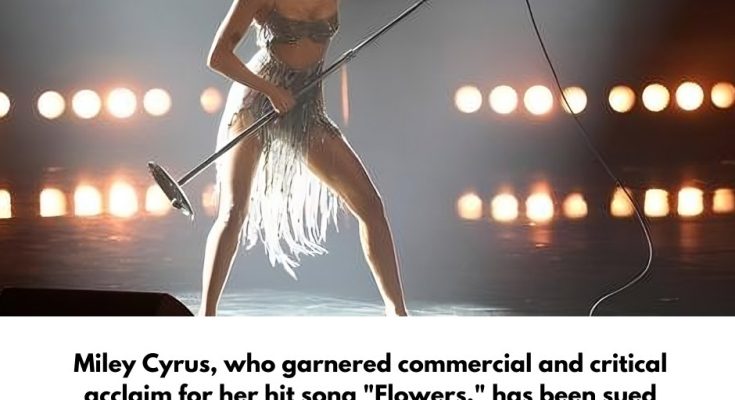Miley Cyrus is facing legal trouble as a result of her smash hit “Flowers.” A new lawsuit claims that elements of her song bear too close a resemblance to Bruno Mars’ popular track “When I Was Your Man,” leading to allegations of copyright infringement. This lawsuit, filed by Tempo Music Investments in a Los Angeles court, suggests that Cyrus’ song may have copied several key aspects of Mars’ hit single, sparking debate over originality and creative inspiration in the music industry.
The Lawsuit: Allegations Against Miley Cyrus

The lawsuit, brought by Tempo Music Investments, accuses Miley Cyrus of copying multiple elements from Bruno Mars’ 2013 song “When I Was Your Man.” Tempo Music, which acquired a portion of the copyright from the song’s co-writer, Philip Lawrence, claims that Cyrus borrowed significant components for her song “Flowers.”
According to the lawsuit, “Flowers” incorporates specific melodic, harmonic, and lyrical elements from Mars’ song. The similarities cited include the melodic pitch design, the sequence of the verse, bass-line connections, certain bars of the chorus, theatrical music elements, lyrical parallels, and chord progressions that are integral to both songs. Tempo Music asserts that Cyrus’ track didn’t achieve its widespread success independently, suggesting that the copied elements contributed to its popularity.
Comparing ‘Flowers’ and ‘When I Was Your Man’
Released ten years apart, “Flowers” by Miley Cyrus and “When I Was Your Man” by Bruno Mars both share emotional themes of love, loss, and personal reflection. However, it’s the specific parallels in the lyrics and musical composition that are at the heart of this lawsuit.
In “When I Was Your Man,” Bruno Mars reflects on regrets in a past relationship with lines like:
“I should’ve bought you flowers and held your hand, shoulda gave you all my hours when I had the chance; Take you to every party, ’cause all you wanted to do was dance, now my baby’s dancin’, but she’s dancin’ with another man.”
In contrast, “Flowers” by Miley Cyrus strikes a more self-empowered tone:
“I can buy myself flowers, write my name in the sand; Talk to myself for hours, say things you don’t understand; I can take myself dancing and I can hold my own hand, yeah, I can love me better than you can.”
Both songs center on themes of reflection and self-love, but the lawsuit claims that the structural and thematic similarities go beyond mere inspiration. According to Tempo Music, these elements are more than coincidental, and they believe the creative overlaps between the two tracks constitute a copyright violation.
Why the Lawsuit Matters: Copyright and the Music Industry
This lawsuit brings up a critical issue that has long existed in the music industry: the fine line between inspiration and imitation. Musicians often draw inspiration from the works of others, and there are only so many chord progressions and themes that can be used in songwriting. However, when similarities become too close—especially in melody, structure, or lyrics—it can lead to legal disputes over copyright infringement.
Tempo Music’s lawsuit highlights how ownership of intellectual property, such as a song, extends beyond the primary artist to co-writers and rights holders. In this case, Tempo Music acquired its stake in “When I Was Your Man” through the catalog of Philip Lawrence, one of the song’s original co-writers, giving them the legal standing to pursue this case.

The outcome of this lawsuit could have a significant impact on future cases of copyright disputes in music. As more artists face scrutiny over similar-sounding tracks, the case will likely contribute to the ongoing discussion of what constitutes fair use and what crosses the line into plagiarism.
The Success of ‘Flowers’ and Its Impact on the Case
There’s no denying that “Flowers” has been a monumental success for Miley Cyrus. Released in 2022 on her ex-husband Liam Hemsworth’s birthday, the song quickly rose to the top of the charts and re-established Cyrus as a major force in the pop music world.
The lawsuit points out the commercial and critical success of “Flowers,” noting that the track earned Cyrus her first Grammy wins at the 66th Annual Grammy Awards. She took home awards for Record of the Year and Best Pop Solo Performance, marking a high point in her career. Tempo Music’s lawsuit suggests that the success of “Flowers” is directly linked to its alleged borrowing from Mars’ “When I Was Your Man,” which also earned Mars a Grammy nomination for Best Pop Solo Performance at the 56th Grammy Awards.

While the song’s success undoubtedly contributes to the stakes of the lawsuit, it’s also what makes the case so high-profile. With millions of streams and wide recognition, any ruling in favor of Tempo Music could have significant financial and reputational consequences for Cyrus.
Miley Cyrus’ Response and Potential Outcomes
As of now, Miley Cyrus and her legal team have yet to publicly respond to the lawsuit. It remains to be seen how they will defend “Flowers” against the copyright infringement claims. However, cases like this often result in settlements, where the accused party agrees to share profits or give credit to the original creators without admitting any wrongdoing.

If the court rules in favor of Tempo Music, it could mean a financial payout for the rights holders of “When I Was Your Man.” Additionally, if the court finds that Cyrus’ song too closely mimics Mars’ work, there could be changes in how the song is credited or royalties distributed.
On the other hand, if Cyrus is able to prove that the similarities fall within the realm of creative inspiration and not copyright infringement, she will likely continue to enjoy the success of “Flowers” without further legal complications.
Conclusion: The Battle Over Originality in Music
The lawsuit against Miley Cyrus over her hit song “Flowers” and its alleged similarities to Bruno Mars’ “When I Was Your Man” shines a light on the complexities of music creation and copyright law. As the music industry becomes more competitive, and as songs continue to draw on shared themes and structures, disputes over originality are becoming increasingly common.
Whether this lawsuit ends in settlement or goes to court, it will likely be a significant case in shaping future copyright claims in the music industry. For now, fans of both Miley Cyrus and Bruno Mars will be watching closely to see how this legal battle unfolds.



